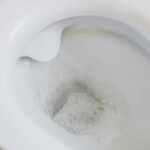Have you ever wondered if baking soda and vinegar can really tackle those pesky hair clogs in your drains? While these household staples can create a fizzy reaction that dislodges some debris, their effectiveness on hair buildup is often overstated. To truly understand how they work—and what they can’t do—you need to consider the science behind it. Let’s explore how these ingredients interact with hair and what alternatives might be more effective.
The Chemistry Behind Baking Soda and Vinegar
When you mix baking soda and vinegar, you’re not just creating a fizzy reaction; you’re witnessing an interesting chemical interaction.
Baking soda, a base, reacts with vinegar, an acid, to produce carbon dioxide gas, water, and sodium acetate. This bubbling action helps to dislodge debris and buildup in drains, making it a popular choice for tackling clogs.
As the gas forms, it creates pressure that can help push materials out of the way. While this reaction is effective for cleaning, it’s important to remember that it won’t dissolve hair entirely.
Instead, it can break down some of the build-up around it, making it easier to clear away. So, while it’s a handy tool, it’s not a complete fix for hair clogs.
How Hair Clogs Form in Drains
Hair clogs in drains are a common nuisance that can quickly turn into a frustrating problem.
Over time, strands of hair accumulate in your drain, often combining with soap scum, grease, and other debris. When you wash your hair, loose strands can easily slip down the drain, eventually forming a tangled mass that restricts water flow.
This buildup can occur in bathroom sinks, showers, and tubs, leading to slow drainage or complete blockages. Regular maintenance is key; using a drain cover can catch hair before it enters the pipes.
If you notice slow drainage, act quickly to prevent a larger blockage. Understanding how hair clogs form helps you stay ahead of potential plumbing issues in your home.
Can Baking Soda and Vinegar Break Down Hair?
How effective is the combination of baking soda and vinegar for breaking down hair clogs?
While this duo is often touted as a natural solution, its effectiveness may be limited. Baking soda, a mild abrasive, can help to dislodge hair, while vinegar’s acidity may help dissolve some organic matter.
However, hair isn’t easily broken down by these substances alone. When mixed, they create a fizzy reaction that can clear minor buildup, but for thicker clogs, you might find their combined power insufficient.
It’s important to note that while this method can be helpful for routine maintenance, it mightn’t resolve more stubborn blockages. Overall, it’s a good starting point, but keep your expectations realistic.
Alternative Methods for Clearing Hair Clogs
While baking soda and vinegar can provide a good start for clearing hair clogs, there are several alternative methods you can turn to for more stubborn blockages.
A plunger is an effective tool; just make sure to create a seal around the drain for optimal suction. If that doesn’t work, try a plumbing snake, which can reach deeper into the pipes to pull out hair.
For a chemical option, a drain cleaner can help, but use it with caution and follow the instructions carefully.
Lastly, boiling water can sometimes dissolve grease and hair together, so pour it down the drain in stages.
Each of these methods can help you tackle those pesky hair clogs efficiently.
Tips for Preventing Hair Clogs in the Future
To keep hair clogs at bay, you can adopt several simple habits that make a big difference.
First, consider using a drain strainer to catch loose hair before it goes down the drain. Regularly clean the strainer to ensure it works effectively.
Second, try to brush your hair before showering to remove excess strands. This practice minimizes the amount of hair that enters your drain.
Additionally, limit the use of heavy conditioners and hair products that can cause buildup.
Lastly, schedule routine drain maintenance—pouring hot water or a mix of baking soda and vinegar monthly can help keep pipes clear.
Conclusion
While baking soda and vinegar can help tackle minor hair clogs by creating a fizzy reaction that dislodges some buildup, they’re not a complete solution for thicker blockages. For those stubborn clogs, you might need a plunger or a plumbing snake. To keep your drains flowing smoothly, consider regular maintenance with these natural remedies and be mindful of hair loss during showers. Taking these steps can save you time and effort in the long run!


